[GSE 2022] Forum on Teacher Education in Metaverse World
date:2022-09-29 13:51author:adminsource:Smart Learning Instituteviews:
Education is one of the main fields of designing innovative metaverse world, providing an immersive and interactive teaching and learning experiences for teachers, students, and other educational stakeholders. It also meets the teaching and learning needs of teachers and students in both the physical world and the virtual world. Carrying out the metaverse research in the field of education will help to further clarify its connotation and future trend, and provide new ideas for seeking a high-quality educational development path, reshaping the relationship between education subjects, and solving problems such as educational equity. As the users of the metaverse, teachers shall explore how metaverse could be applied in teaching, evaluation and management, which would help them better adapt to the development trend of technology-empowered educational innovation and change.
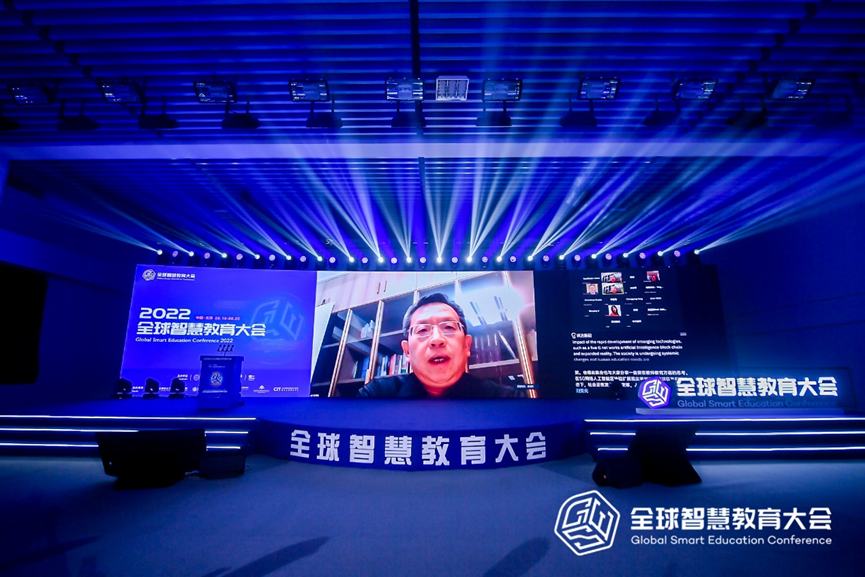
Professor ZHU Xudong, dean of the Faculty of Education of Beijing Normal University
Professor ZHU Xudong, dean of the Faculty of Education of Beijing Normal University, believed the new technology is expected to significantly impact teaching scenarios, teaching resources, teaching organization and evaluation through the deep integration of virtuality and reality, online and in-person teaching. Such technology not only brings new opportunities for teacher development but also makes new requirements for teaching ability. Courses on teacher education and instructional methods need to be upgraded and innovated to respond to the opportunities and challenges brought by the changes of the times and technological development.
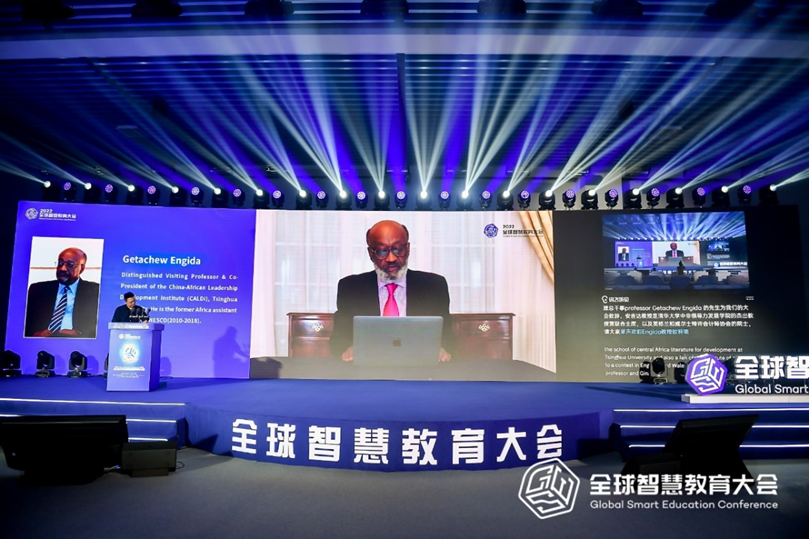
Professor Getachew Engida, former deputy director-general of UNESCO
Professor Getachew Engida, former deputy director-general of UNESCO, highlighted that the era of sustainable development calls for innovation, which comes from new systematic thinking, new operating methods and technologies. There is a long way to go to achieve the goals set by the 2030 Agenda for Sustainable Development. The international community will make joint efforts to explore the potential of technology and innovation.
Potential of the Metaverse in Education and Teacher Professional Development

Professor CHEN Zhong from the School of Computer Science of Peking University
Professor CHEN Zhong from the School of Computer Science of Peking University delivered a keynote speech on "The path of innovative development of the integration of metaverse and Web 3.0". He pointed out the metaverse provides new development opportunities for future education. He systematically discussed the role of blockchain played in the metaverse in education and shared the innovative application scenarios of the metaverse and Web3.0.

Mr Awol Endris Adem, education programme specialist at UNESCO Regional Office for Eastern Africa
Mr Awol Endris Adem, education programme specialist at UNESCO Regional Office for Eastern Africa, highlighted the issues on teachers, the digital divide and the metaverse. He proposed that teachers shall be equipped with better digital skills to teach in the metaverse world; otherwise, the use of new equipment and technologies will bring much cognitive load to teachers. Metaverse can also enrich teaching content and provide support and assistance for teacher training.
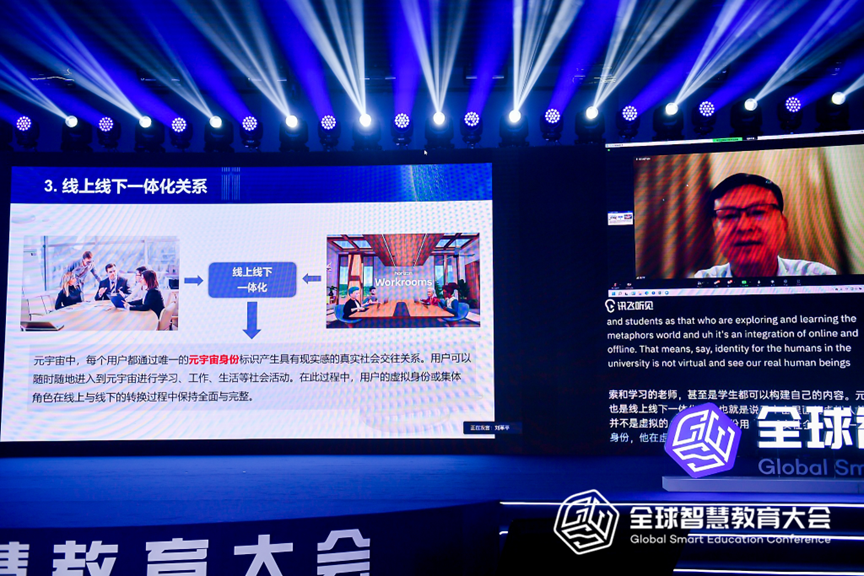
Professor LIU Geping, the vice chairman of China Higher Education Information Academy (CHEIA)
Professor LIU Geping, the vice chairman of China Higher Education Information Academy (CHEIA), focused on "Metaverse-supported Teacher Development Scenarios" and gave further elaborations, including the scenarios of simulating teaching trials, improving teaching adaptability, rehearsing classroom management, promoting teaching interactions, enhancing the ability of empathy, and supporting teaching reflection.
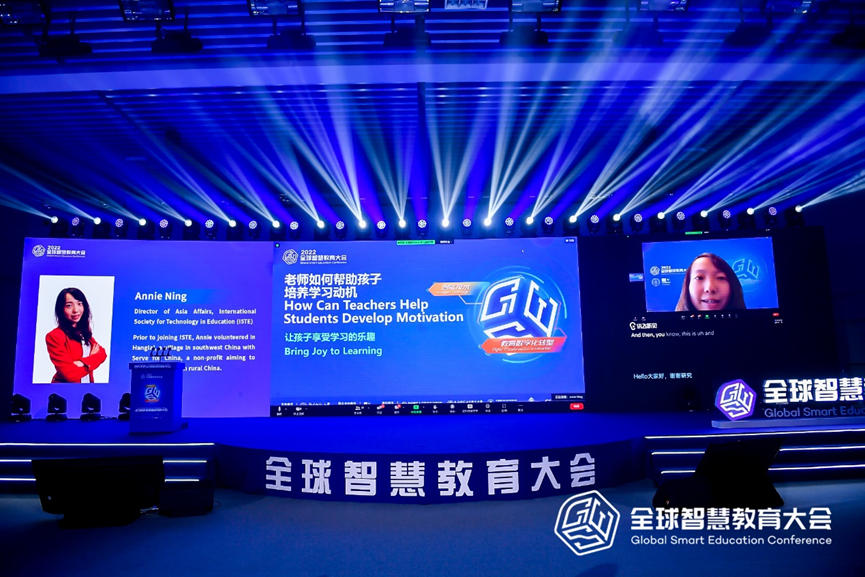
Ms Annie Ning, director of Asia Affairs of International Society for Technology in Education (ISTE)
Ms Annie Ning, director of Asia Affairs of International Society for Technology in Education (ISTE), cared about how to improve students' learning motivation. Taking the subjects of Chinese, mathematics, and English as examples, she emphasized the influences of scenes, tasks, games, and other factors on students' learning motivation through a detailed explanation of several teaching cases, which inspires the innovative design of pedagogic activities.
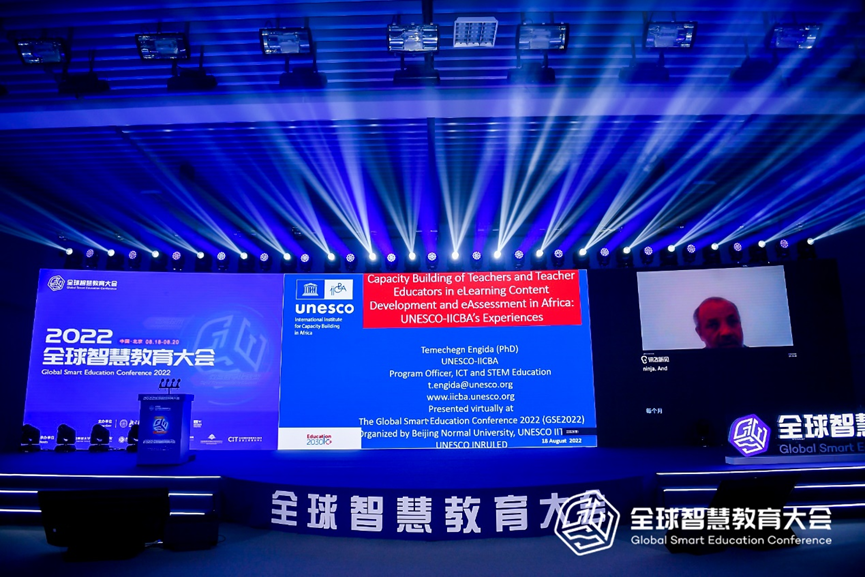
Dr. Temechegn Engida, programme officer at International Institute for Capacity Building in Africa (IICBA)
Dr. Temechegn Engida, programme officer at International Institute for Capacity Building in Africa (IICBA), shared his thoughts on “Capacity Building of Teachers and Teacher Educators in e-Learning Content Development and e-Assessment in Africa” based on his working experiences at IICBA. In Africa, the traditional approach to e-learning costs a lot for teachers, and teachers are only seen as consumers of digital content. He encouraged teachers to set up teams, use affordable technologies to design curricula and work together on the analysis, design, development, implementation, and evaluation of e-learning content.
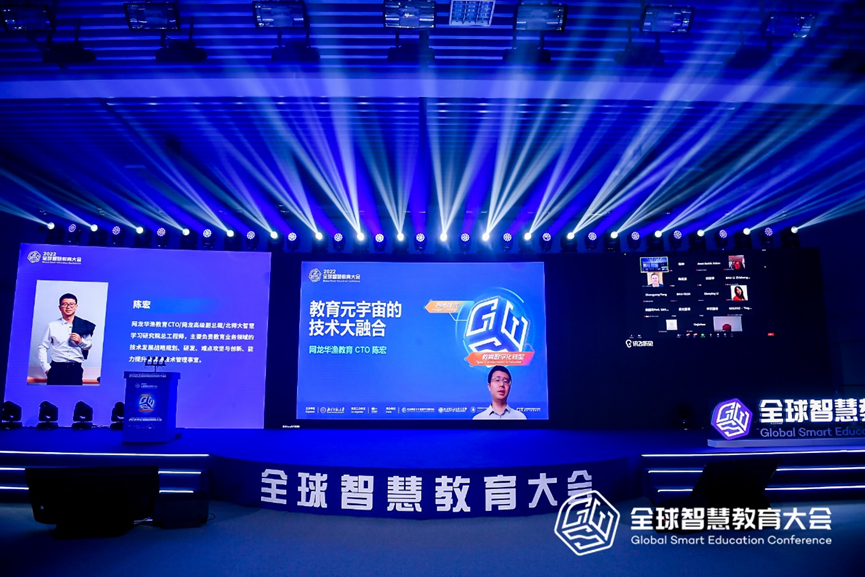
Mr CHEN Hong, senior vice president of NetDragon
Mr CHEN Hong, senior vice president of NetDragon, shared his thoughts and practices on the great technological convergence of metaverse in education. He presented a video on the metaverse to let audiences experience how the metaverse is applied in real-world teaching and pointed out the advantages of the metaverse, such as promoting personalized learning, stimulating learning interests, enhancing learning effects, and optimizing experiment or training modes. He also introduced how the teaching content is produced for the metaverse world from a technical level.
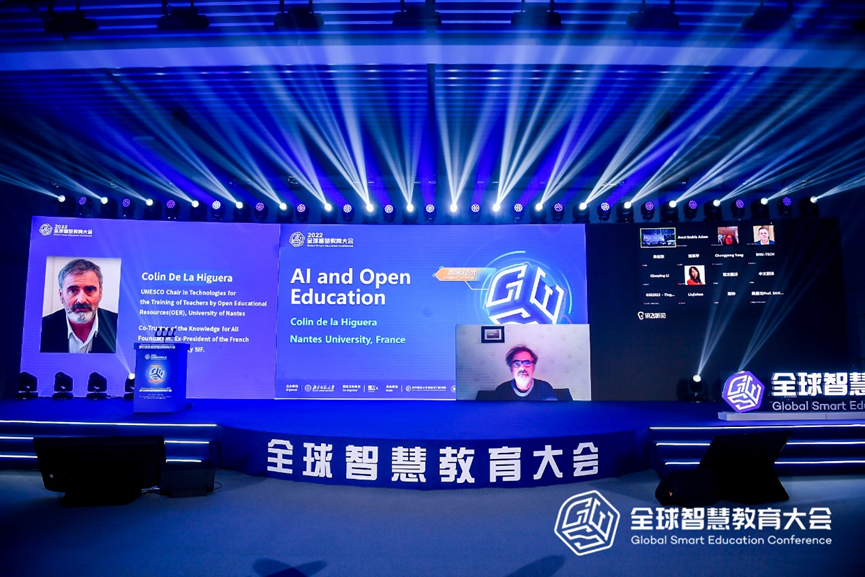
Professor Colin De La Higuera from the University of Nantes in France focused on Artificial Intelligence and Open Education
Professor Colin De La Higuera from the University of Nantes in France focused on Artificial Intelligence and Open Education. He introduced some ongoing projects, including Open Education Global 2022, FLORILEGE, and Multiling-OEG, based on which he reflected on the project practice about "industrial takeovers education" and "the supervision of open education resource".
To boost teacher ICT competency development, provide educators with advanced digital resources and AI-based educational solutions, strengthen teaching networks, and overall contribute to capacity building in target regions, UNESCO IITE and a global leading creator of Internet communities NetDragon Websoft Holdings (NetDragon) have joined efforts to create the online platform – “E-Library for teachers”. This platform represents a hub that serves as a resource and training as well as, communication and networking center for teachers around the globe with open education resources in English and Russian languages (Arabic is coming soon). For over a year partners and members of the project team have been working together to bring this platform to life. In order to amplify the impact of the platform and provide teachers with quality resources, IITE reached out to international organizations holding expertise in the upliftment and empowerment of educators worldwide.
On June 8, 2022, UNESCO IITE and NetDragon officially launched the “E-Library for teachers” to the high officials and partners such as the representatives of the Ministries of Education from the target countries (the Republic of Serbia, the Republic of Tunisia, the Republic of Ghana, the Arab Republic of Egypt, the Russian Federation, the Kingdom of Thailand) and partners from Beijing Normal University (BNU), the Commonwealth of Learning (COL), International Society for Technology in Education (ISTE), Autodesk, Arab League Educational, Cultural and Scientific Organization (ALECSO) and Go-Lab.
(Reference: https://iite.unesco.org/highlights/official-launch-of-the-platform-e-library-for-teachers/)
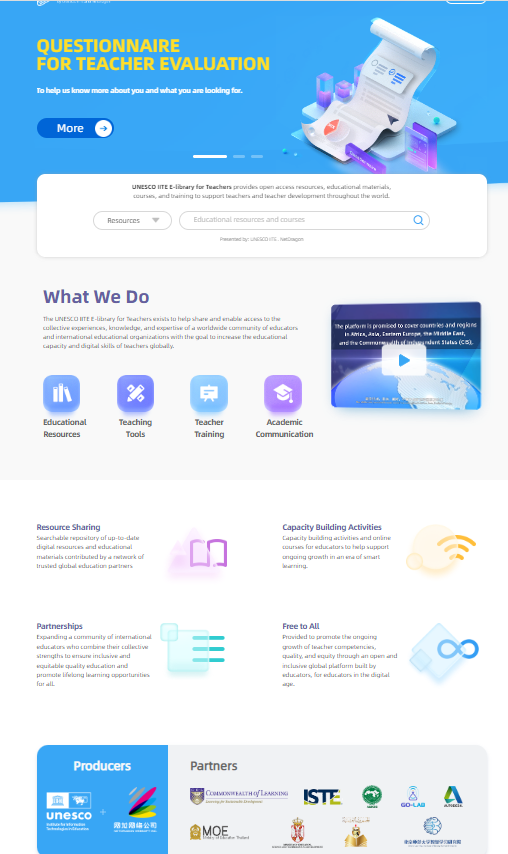
Application and Innovation of Educational Metaverse Scenarios
In this forum, experts and scholars from the Netherlands, Romania, the United States, Greece, South Korea, India and other countries conducted in-depth discussions on the application of metaverse in various teaching scenarios.

Professor Ton de Jong from the University of Twente in the Netherlands
Professor Ton de Jong from the University of Twente in the Netherlands introduced Go-Lab - an Ecosystem for Inquiry-Based Instruction. He first pointed out the existing problems in STEM education and believed Go-Lab could create effective teaching scenarios for teachers. As an online learning platform, Go-Lab can not only be embedded with multimedia teaching resources and software but also support students to co-share resources and solve practical problems faced by teachers in STEM education.

Professor Elvira Popescu from the University of Craiova in Romania
Professor Elvira Popescu from the University of Craiova in Romania paid close attention to peer assessment platform for smart education. She argued that although peer assessment is essential for students and teachers, it raises issues of authenticity, validity and fairness. She introduced the “LearnEval” peer-evaluation platform and the results of case studies. She believed the future development trend of peer evaluation platforms is to strengthen the intelligence of the platform and realize real-time peer evaluation and feedback.
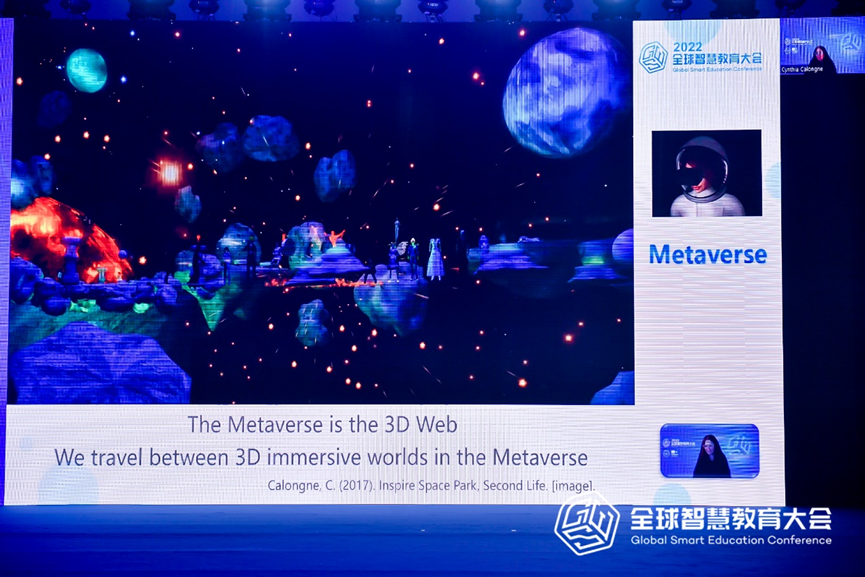
Professor Cynthia Calongne from Parker University in the USA
Professor Cynthia Calongne from Parker University in the USA highlighted the advantages of the metaverse in education. The application of metaverse can not only help teachers create virtual learning environments but also help students enhance peer perception and the ability of collaborative communication. The future development of the metaverse shall strengthen its relevance to the real world and technological innovations in order to provide students with more efficient tools.
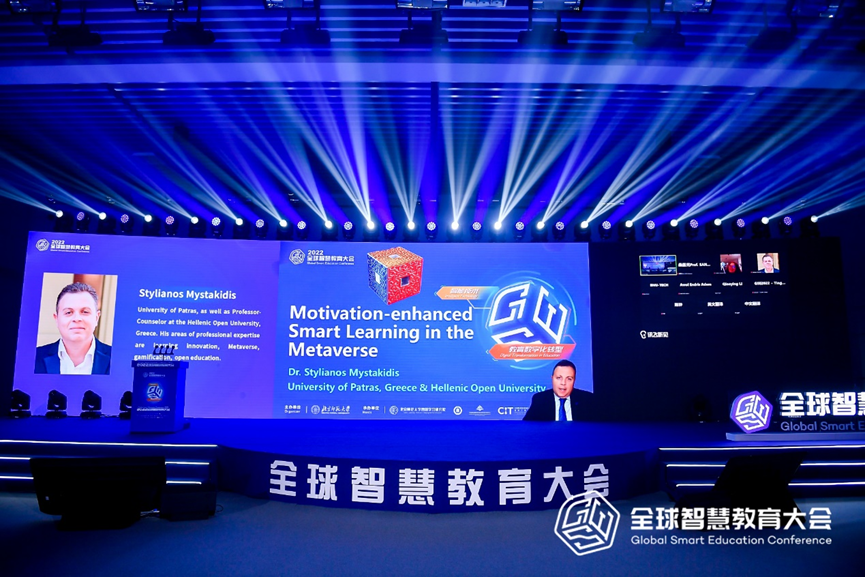
Researcher Stylianos Mystakidis from the University of Patras in Greece
Researcher Stylianos Mystakidis from the University of Patras in Greece gave a presentation on “Motivation-enhanced Smart Learning in the Metaverse”. He believed the metaverse is a bridge to promote the transformation of education and instructional mode. In this context, gamification design, toys and interesting design can better enhance students' learning motivation and promote intelligent learning.

Dr. Lik-hang Lee from the Korea Advanced Institute of Science and Technology
Dr. Lik-hang Lee from the Korea Advanced Institute of Science and Technology reported on " When Education meets the Metaverse: an overview and challenges". He analyzed the three stages of metaverse development and how to build the metaverse world; then, he introduced some classic cases like Roblox, Minecraft, Facebook workshops, etc. He finally shared his views on the challenges facing the metaverse in education, such as issues on a hardware device, students' social presence, and student interaction and feedback.
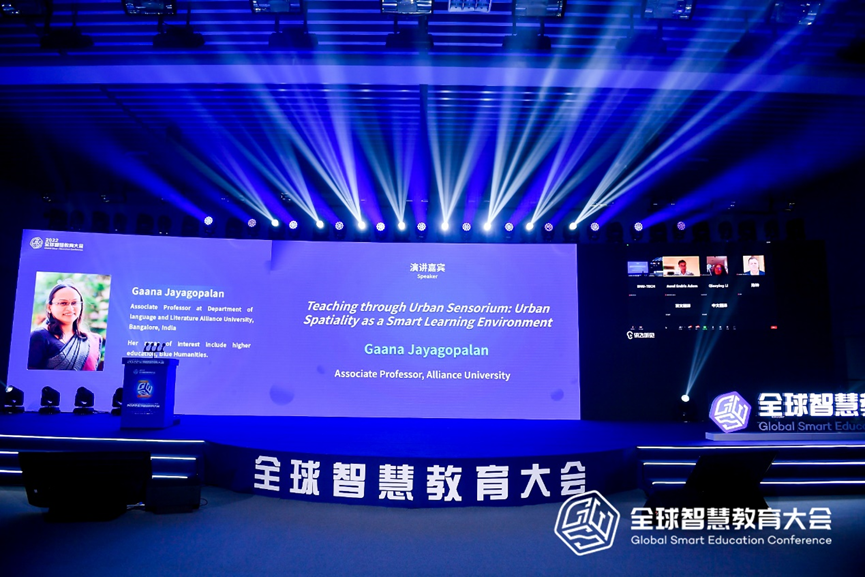
Dr. Gaana Jayagopalan from the Alliance University in India
Dr. Gaana Jayagopalan from the Alliance University in India delivered a speech on “teaching through urban sensorium: urban spatiality as a smart learning environment”. She proposed we should change the conception that teaching only happens in traditional classrooms and extend learning space to urban buildings as the urban spatiality may provide possibilities for intelligent teaching.

